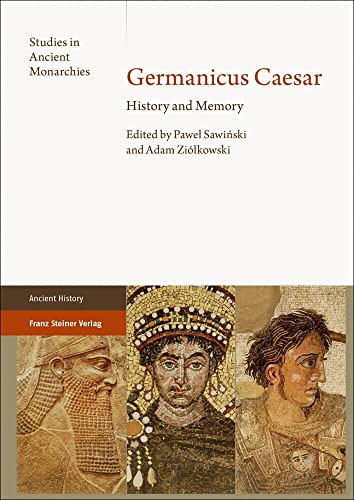
Germanicus Caesar
by Pawel Sawinski
"History and Memory"
Popularity
1.06 / 5
* A book's popularity is determined by how it compares to all other books on this website.
Where to buy?
Buy from Amazon* If you buy this book through the link above, we may receive a small commission at no extra cost to you.
Germanicus Caesar by Pawel Sawinski
Details
Perspective:
Researcher
Biography:
No
Region:
Europe
Published Date:
2023
ISBN13:
9783515134408
Description
Brief Summary
Germanicus Caesar by Pawel Sawinski presents a detailed exploration of the life and legacy of Germanicus Caesar, a significant figure in Roman history. Although never an emperor himself, Germanicus was a prominent character of the Roman principate, chosen by Augustus as a potential successor and placed in influential military positions. This book examines his role not only in military conquests and the political sphere but also in the transition of the principate from the Augustan phase to its mature form. Germanicus's enduring legacy is analyzed through various perspectives, including history, classical philology, art history, archaeology, numismatics, Egyptology, and Roman law, highlighting the breadth of his impact on Roman culture and historical memory.
Main Themes and Topics
The main themes of Germanicus Caesar revolve around the complex nature of power, legacy, and historical memory. The book delves into the influential yet enigmatic presence of Germanicus in Roman history as a non-emperor who significantly impacted military and political realms. The theme of transition is central, portraying the shift in Roman governance from Augustus's era to a more genetically established lineage and mature principate. The exploration of Germanicus's role across diverse domains, such as art, law, and coins, underscores the multifaceted dimensions of his legacy.
Writing Style and Tone
Sawinski adopts an academic and analytical writing style, suitable for readers interested in historical, classical studies, and Roman history enthusiasts. The tone is scholarly, aiming to provide a comprehensive and multidisciplinary analysis of Germanicus Caesar's legacy. The inclusion of diverse fields such as Egyptology and Roman law within the narrative exemplifies the author's commitment to a holistic understanding of his subject
Awards and Recognition
While there is no specific mention of awards for Germanicus Caesar, the book's academic rigor and multidisciplinary approach contribute to its recognition within historical and classical studies communities. Its contribution to understanding a complex historical figure ensures it is a valuable resource for scholars and students alike.
Criticism
Germanicus Caesar may be challenging for casual readers due to its dense academic content and the specialized fields it covers. The depth of analysis in classical philology, law, and archaeology might appeal more to readers with a keen interest or background in these areas. Some readers may find the book's extensive focus on historical memory and legacy a departure from more conventional narrative histories.









